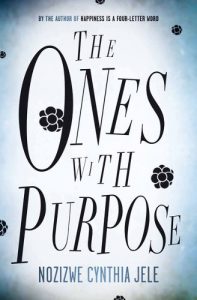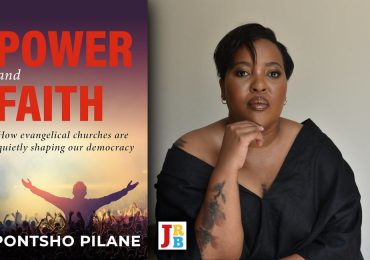Editorial Advisory Panel member Nozizwe Cynthia Jele chatted to The JRB Editor Jennifer Malec about her new novel, The Ones with Purpose, which will be out on 20 April, 2018.

The Ones with Purpose
Nozizwe Cynthia Jele
Kwela Books, 2018
Jennifer Malec for The JRB: Most writers describe writing their second book as being a completely different experience from their first, but in your case your two novels are also extremely different in tone and subject matter. What prompted the change?
Nozizwe Cynthia Jele: The novels are different. My writing tends to reflect life experiences—personal, observed or imagined—at a point in time. I was twelve years younger when I wrote Happiness Is a Four-Letter Word. At that time, I remember wanting everything—love, money, a good job, great friendships, health—everything. Fast forward, I’m getting older and with that comes acceptance and a certain appreciation of life. Life gives and life takes, one learns to find the balance.
The JRB: Did you find any new challenges in writing the second book?
Nozizwe Cynthia Jele: Writing Happiness Is a Four-Letter Word was fun. I was unknown as a writer and there were no expectations from anyone but myself to write and complete the book. The Ones With Purpose took forever to get right because of the sensitivity of the subject matter, and I now had to think of the readers.
The JRB: Happiness Is a Four-Letter Word is an entertaining, readable book, while The Ones With Purpose, though equally readable, is more literary. It’s almost as if you were grabbing non-readers’ attention with your first book, and with the second you’re extending their literary horizons.
Nozizwe Cynthia Jele: I understand that Happiness has a more mainstream appeal than The Ones With Purpose, but my main objective is still to build a bigger reader base for fiction in this country and beyond—which is why it’s important that my work is accessible or readable and resonates with the readers. The heaviness of the subject matter—alcoholism, terminal illness, death—will naturally force a reader to interact with The Ones With Purpose differently to Happiness.
It is eight years since Happiness Is a Four-Letter Word was published. Have you been writing The Ones With Purpose this whole time, or did you take a break, or did you feel the pressure that comes with the dreaded second novel? Or were you just busy?
Nozizwe Cynthia Jele: [laughs] All of the above. The earliest draft of The Ones With Purpose dates back to 2011! HIV was a central theme of the book, but changed over time to cancer because very little is said, let alone written, about this disease in the black community. I lost my aunt to cancer about two years ago, and as a family we haven’t spoken about it.
The Ones With Purpose is a moving story that explores how a family copes with terminal illness. What kind of research did you do for the book?
Nozizwe Cynthia Jele: Lots of internet research—websites, blogs, videos—and I read a couple of books written by survivors and those who ultimately lost the fight. I also spoke to friends whose lives have been affected by cancer (directly or indirectly) and had a medical doctor read the manuscript. It got emotional at times, but I really wanted to do justice to Fikile’s character.
All your characters illustrate the mutability of human nature, but some, like Thiza and Ma Margaret, for example, are hard to forgive. And yet by the end we do begin to understand them. Do you write character sketches before beginning, or do they grow as you write?
Nozizwe Cynthia Jele: Although I start my stories with an outline, characters’s journeys reveal themselves as the stories develop. Thiza was the most complex to write because I didn’t like him much, yet he was necessary. I had to be careful not to make him completely inhuman—but he is still trash.
Social status plays an interesting role in the novel as well. Auntie Ntombi, for example, at whose house the children eat eggs and meat ‘every day’, is the only woman Anele knows who is brave enough to divorce her husband. (Strong echoes of the relationships in Happiness here.) Auntie Betty, on the other hand, is not shy to mock Sizwe’s handyman profession, in front of the family, despite the fact that he is well-liked and dependable (or so we believe).
Nozizwe Cynthia Jele: Yes, how the characters behave is very much linked to how they view their position in the family and society in general, and that in turn influences how others respond to them. Auntie Ntombi, the educated aunt, commands a certain respect from the family; Thiza has never been taken seriously by anyone from the beginning because of his deceitfulness; and Margaret, who in her destitution somehow expects a prestigious funeral for her daughter, finds her confidence building up with the return of Mbuso, her successful son.
Much of the novel is descriptive of South African life; it’s a well-told story, and it’s very compelling. But it’s also painfully sad at points, and you manage to evoke powerful emotions with the simplest of sentences. The sentence ‘We hug and return home without Fikile’, for example, gave me chills. Was this technical side of the writing something you worked on? I imagine the impulse would be to write more words to impart emotion, not fewer.
Nozizwe Cynthia Jele: Thank you for this observation. Because of the flashbacks, I found myself overwriting (it’s easy to create memories). The manuscript became laborious and confusing, so I got to a point where I had to be ruthless and kill those paragraphs. It’s a short book but complete; I feel I’ve said what I needed to say.
You first came to prominence as a writer when you won both first and fourth prizes in the 2008 BTA/Anglo Platinum Short Story competition, and you have a number of short stories published online. Have you thought about publishing a short story collection?
Nozizwe Cynthia Jele: Actually, I’m working on a project to self-publish a collection of erotica short stories as a way to raise funds for various initiatives promoting reading and writing. I’ve reached out to friends in the writing community to contribute to the first anthology, hopefully this will grow to become an annual collection. I’m excited and can’t wait to see this project take off.
You once said if you made enough money you would love to write full-time. Well, the movie of Happiness Is a Four-Letter Word made over R10-million at the box office … has the idea of writing full-time gained any traction?
Happiness Is a Four-Letter Word has made enough money to pay back investors. Unfortunately, the hustle continues for us writers. True story.
In a recent interview you mentioned that you mainly read African literature at the moment. What are your favourite classics? And have you discovered any more recent gems that you could recommend?
Nozizwe Cynthia Jele: Not sure if these qualify as classics, but they are my firm favourites: Chimamanda Ngozi Adichie’s Purple Hibiscus, Petina Gappah‘s An Elegy for Easterly, Songeziwe Mahlangu‘s Penumbra, Masande Ntshanga’s The Reactive, Shaun Johnson’s The Native Commissioner, Uwem Akpan’s Say You’re One of Them, and Alexandra Fuller’s Don’t Let’s Go to the Dogs Tonight (a memoir). I’ve also enjoyed Chigozie Obioma’s The Fishermen. I’m currently reading Niq Mhlongo‘s Soweto, Under the Apricot Tree and Lesley Nneka Arimah’s What It Means When a Man Falls From the Sky.
- Jennifer Malec is the Editor; follow her on Twitter.
- Follow Editorial Advisory Panel member Nozizwe Cynthia Jele on Twitter.






I can’t wait to read the entire book, while I was reading the first passages…you want to read more and of course thank you for talking about another disease affecting the black community…”Cancer” not much is said about its effects.. I lost my father through prostate cancer…Anyway you work is in highest standards. ..I cant wait to get the book…Malibongwe igama labafazi! !!!